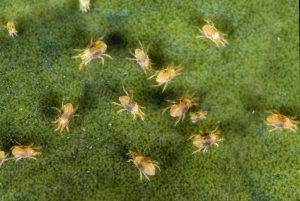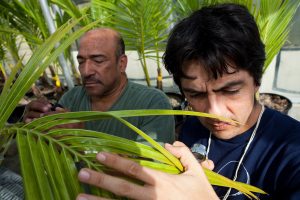
Mites are arachnids that are found in almost every environment with more than 55,000 described species worldwide. Some mites are classified as pests, while others are beneficial.
Those who study mites are known as acarologists.
Fewer than 100 scientists in the United States specialize in mites of agricultural importance.
“This is a problem. Mites are multiplying and emerging in agriculture as a species of economic importance worldwide due to their threat to a variety of commodities and crops,” said Alexandra Revynthi, an assistant professor of ornamental entomology and acarology at the UF/IFAS Tropical Research and Education Center (TREC).
That is why she is working on growing the number of experts available to tackle pest mites. Back by popular demand, she will host the Agriculture Acarology Workshop, May 6-9, 9 a.m. to 5 p.m. at the 18905 SW 280 St., Homestead, Fla. Space is limited to 17 participants.
The workshop is designed for graduate students, Extension agents, government and state agents, biological control practitioners, local growers and grove managers from around the world.
By the end of the weeklong workshop, participants will be able to identify:
- Major groups of pest and predatory mites in the lab as well as in the field.
- Local pest mites and recommend management strategies.
- Natural enemies of pest mites and implement them in an integrated pest management program (IPM).
Cost to attend is $300 for students and $700 for other participants. Registration is required.
“Mites are diverse in so many ways when you consider their habitat, their behavior, their feeding habits, their body shape, size and color. We can find them everywhere including the oceans,” said Revynthi. “They can be beneficial, parasites of plants, animals, or other arthropods, and decomposers. They are very small, and this intimidates many researchers, but the damage they can cause is inversely proportional to their size.”
Acarology has made vital contributions to the sustainability of agriculture. Many biological control agents are mites. A critical example of sustainable mite management in Florida was the development of a postharvest treatment for the Lychee erinose mite (LEM), an invasive pest that infests lychee trees. Once identified, a quarantine was established and growers were prohibited from selling the fruit outside of Lee County, the epicenter of the infestation.

To solve this problem, Revynthi together with researchers from UF/IFAS and U.S. Department of Agriculture tested dipping lychee fruit in an oil solution for 60 seconds after picking them. The treatment killed the mites and other bugs without impacting the fruit quality allowing growers to disinfect the fruit and safely sell it outside the state. The treatment was approved by the Florida Department of Agriculture and Consumer Services Division of Plant Industry.
“In my opinion mites are the best arthropods to use to conduct fundamental research,” said Revynthi. “Their ability to reproduce fast and in large numbers makes them the perfect arthropod study system to answer questions related to evolutionary biology and population dynamics.”
While the workshop is most beneficial for students who are starting their studies on mites or on systems that involve mites, it is also a critical tool for Extension and regulatory agents who see samples every day.
“Students learn how to maintain mite colonies, how to conduct experiments and bioassays, how to collect, extract, mount and identify the mites at least to the family level,” she said. “We provide information on the four main pest groups of mites and their predators. We try to bring experts from all over the world to share their knowledge and passion for this area of expertise.”
Growers and grove managers will benefit from learning how to scout and recognize mite pests based on the symptoms as well as how to approach an infestation. The workshop provides information about the management and the biocontrol agents that are available in the market.
###
By Lourdes Mederos, rodriguezl@ufl.edu
ABOUT UF/IFAS
The mission of the University of Florida Institute of Food and Agricultural Sciences (UF/IFAS) is to develop knowledge relevant to agricultural, human and natural resources and to make that knowledge available to sustain and enhance the quality of human life. With more than a dozen research facilities, 67 county Extension offices, and award-winning students and faculty in the UF College of Agricultural and Life Sciences, UF/IFAS brings science-based solutions to the state’s agricultural and natural resources industries, and all Florida residents.
WHY FOOD IS OUR MIDDLE NAME
Feeding a hungry world takes effort. Nearly everything we do comes back to food: from growing it and getting it to consumers, to conserving natural resources and supporting agricultural efforts. Explore all the reasons why at ifas.ufl.edu/food or follow #FoodIsOurMiddleName.
 0
0
